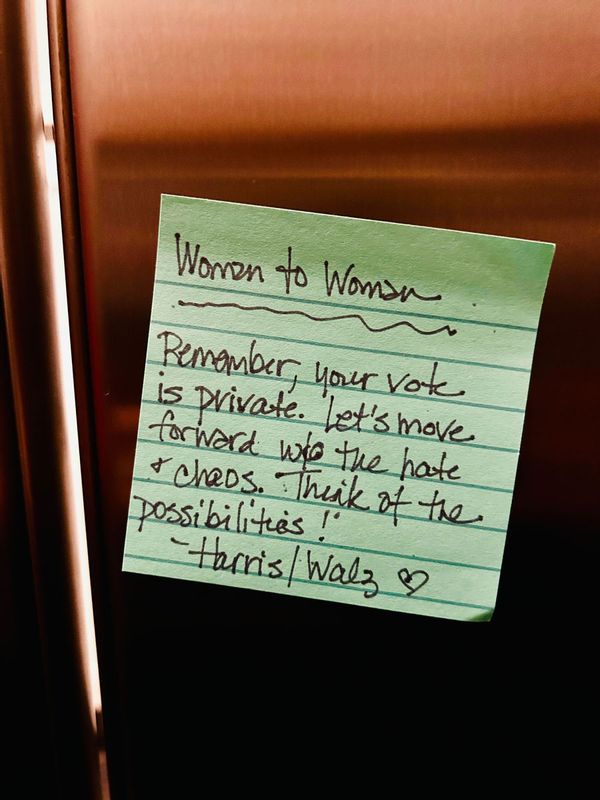I was in a Manhattan museum on a recent October weekend when I noticed the Post-It tacked inside the stall in the ladies' room. "Woman to woman," it read, "Remember, your vote is private. Harris/Walz!" The message was one of encouragement, but it made my heart sink. Never in my lifetime have I lived through an election campaign in which this needed to be shared.
But in the devastating aftermath of Trump winning another presidential election, we find ourselves in a reality marked by fear and intimidation so intense it's little wonder that women have been exchanging secret messages in the few private spaces we have left.
And the threat of — to use Donald Trump's own favorite word, "retribution" — looms so heavily over us we can only brace for what comes after November 5 or January 20, "whether the women like it or not." We women have been robbed of what could have been a momentous campaign and a historic victory.
We've normalized weird for so long that it seems impossible to suggest that it didn't have to be this way. Just a scant few election cycles ago, the tenor of political debate featured losers who conceded, voters who didn't storm the Capitol and representatives who didn't try to overturn elections.
In an alternate reality, Harris might have faced a Republican opponent who didn't question her racial identity and routinely mispronounce her first name. She might not have had mainstream pundits accuse her of being "a DEI hire" or of sleeping her way to the top. The fact that she doesn't have biological children might not have been weaponized as a rebuke of her "humbleness." And her opponent's former aide wouldn't be joking about overturning the 19th Amendment.
But civil discourse has been ground down to a useless nub at this point, and a presidential candidate can share crude jokes about his opponent with barely a blip in the news cycle. A candidate who has also been convicted of felonies, who has been found liable by a civil jury of sexual assault. Meanwhile, once reputable newspapers now run by billionaires refused to endorse a competent, coherent woman for president.
Hey, guys — because I guess the last eight years of women's marches and #MeToo didn't make it clear — how do you think this has made women feel? Women of color? Women who have endured sexual harassment and survived sexual assault? What do you think the lesson we've been gleaning here has been about our worth in our own country?
Last week, I asked some women to reflect on those questions and this campaign.
"Throughout my whole family's history, people in my family have reached a place where white male society said, 'OK, that's far enough,'" my friend Celeste Headlee, author of "We Need to Talk," told me. "Most women, but every woman of color, has had their intelligence underestimated, has been called angry, has been called aggressive, has been called intimidating. I've lost two jobs where they specifically told me it was because I was 'an angry person.'"
"Watching Kamala Harris run for president is like watching all of the disappointments and heartaches of your life playing out in real time, except this time the stakes aren't me losing a job," Headlee observed. "The stakes are losing democracy, losing all reproductive rights, losing bodily autonomy in a way that hasn't happened to women of color, really since the end of the Civil War."
The complacent political sexism of those near to us has been a wounding disappointment.
Journalist and workplace equity expert Farai Chideya viewed this moment similarly. "When you look at this race, you can't underestimate the impact of misogyny," she said.
"There are many different ways in which Kamala Harris is taken to be less viable because of her gender, and the combination of her gender and race. She is dealing with not just sexism, but also specifically misogynoir."
I have been trying, for the sake of my daughters and their generation, to stay positive, even while grieving that they have fewer reproductive rights today than I did at their ages. I can recognize the gains we've made despite and because of staggering setbacks. Would we have had #MeToo without the anguish of Hilary Clinton's 2016 defeat? Would we now have a record number of women in Congress? Heck, would we have had "Barbie"?
"When it comes to social justice, you can't put the genie back in the bottle," Lily Burana, author of "Grace for Amateurs," told me. "Women and Gen Alpha girls have an awareness of systemic misogyny, of queer issues, of their value, in a way that would be literally unthinkable to me as a Gen X girlie. Once you've turned over the rock, and people have seen these systems of oppression, you cannot unsee them."
It's undeniable that the last several years have been a cataclysmic era of significant advancements for gender equality. They've also undeniably been a spectacular bummer, on a macro and micro scale.
The insight that Burana speaks of is painfully omnidirectional, and we can also never unsee what we now know about some of the people closest to us — or the agenda they're willing to support. The toxicity and polarization have broken up friendships and divided families, on a profoundly wounding level.
"I just don't know if the [election] result will change the feeling in society," said comedian and writer Micaela Fagan. "It's starting to feel like you don't know who you can trust."
I remember the last time I spoke to a particular family member, and being told firmly that we could "agree to disagree." I can agree to disagree on plenty: tax rates, arts funding, even the nuances and limits of gun control. I can't agree to disagree with a side that's fine with a sexual assailant in the Oval Office. I can't agree to disagree with the dismantling of women's health and privacy.
I can't agree to disagree about doctors refusing medical attention for ectopic pregnancies, and women being arrested for their miscarriages. Have you ever had a miscarriage? I have. It's physically and emotionally devastating enough without the fear that you and your healthcare provider may be questioned, scrutinized, penalized, that you may have your life endangered, for how it's managed. And we can lay all this suffering at the feet of the pitiful carcass of what used to be the Republican party.
Misogyny cuts to the heart of the home and family.
Now that so many of us know exactly which people in our lives are unbothered by the punitive backlash against our sex, how much can ever be right ever again? How can we just be chill at Thanksgiving when on the other side of the table are people who are fully on board for a dystopian Project 2025 future? The patriarchy really counts on women keeping it comfortable and unchallenged, and it counts on it most especially under its own roof.
Of course, there are Dudes for Kamala and MAGA women, but the power dynamics of gender are unique. Soraya Chemaly, author of the appropriately named "Rage Becomes Her," pointed out to me that other forms of oppression, like racism and homophobia, rely on marginalization. But misogyny cuts to the heart of the home and family. She called it "the most intimate inequality." That's what makes it so distressing — and so dangerous.
"Most families are the same race, same ethnicity, same religion, so the pressure point in those families will be gender," she said.
The complacent political sexism of those near to us has been a wounding disappointment. But for other women, the resentment against our gender is far more overt.
The patriarchy wants us afraid. And good job, patriarchy, because I sure am! But more than I'm afraid, I'm angry. And more than I'm angry, I'm determined.
The United States far outpaces its peer nations in maternal mortality. A leading cause of death among pregnant American women, more than hypertensive disorders, hemorrhage, or sepsis, is homicide. So don't talk to me about how dangerous immigrants are, how valued mothers are, when the party that claims it wants to make America great again is so conspicuously silent about intimate partner violence. And the threat of post-election retribution in both public and private settings is real enough to give all of us pause.
"I feel very strongly that either way, it's going to be bad, and it will be bad in different ways," said Chemaly. "Frankly, women, particularly impoverished, Black and brown women, are going to suffer the consequences of either entrenched male supremacist power consolidation or backlash against the idea that the 'women's' party won."
"Maybe it's a choice between being f**ked quickly or being f**ked slowly over time," she said. "In my mind, you're f**ked either way."
I can't persuade anybody of anything. I can just express what I know a lot of women have been feeling: exhausted sadness that any sliver of joy this campaign season had has been sucked away by a vindictive, babbling old man and his crybaby minions.
"Ten years ago, we would have been like, 'Yeah!'" Fagan said. "Everyone would have gotten behind this." Instead, we're passing notes in restrooms. We're cautiously leveraging not just our voices but our stealth.
 A note left in a New York City bathroom stall in late October 2024. (Photo courtesy of Mary Elizabeth Williams)
A note left in a New York City bathroom stall in late October 2024. (Photo courtesy of Mary Elizabeth Williams)
"I feel that we are in the middle of a global women's refusal movement," Chemaly observed. "We don't call it a protest, because it's not the typical protest led by a charismatic leader in the streets. Women are quiet quitting from heteropatriarchy."
The patriarchy wants us afraid. And good job, patriarchy, because I sure am! But more than I'm afraid, I'm angry. And more than I'm angry, I'm determined. The next few years are going to be ugly and upsetting for women in a lot of ways. It will also no doubt be good in others.
"The patriarchy is not going to go quietly, but that doesn't mean that it's not on the way out," said Burana.
And in the meantime — at least for now — our vote is private.
Read more
about the 2024 election



Shares